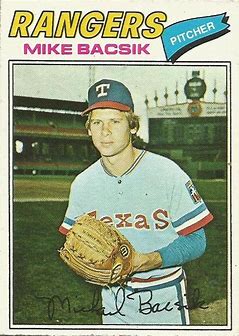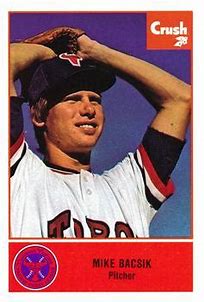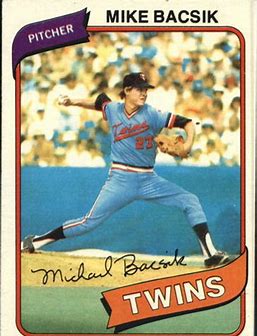Pitcher Mike Bacsik was one of the early Texas Rangers players who helped me learn the pro game. He wasn’t a big star, but that didn’t (and doesn’t) matter. He played and competed hard — the right way — and The Haught Corner is as much for guys like Mike as anyone. Thanks, Mike!
You were drafted by the Orioles in the 55th round of the 1970 draft, but you  didn’t sign. Did you feel you were picked too low, or were there other reasons not to sign?
didn’t sign. Did you feel you were picked too low, or were there other reasons not to sign?
I graduated high school [Bishop Dunne in Dallas] at 6’1” and maybe 160 pounds – I was the point guard on our basketball team. I wanted to sign really bad, but my dad said, ‘the important draft number is the one Uncle Sam has for you: 42.’
Remember, in 1970, Vietnam was in full swing, so it was somewhat of a no-brainer whether to join the service or reserves or go to college; Vietnam made that decision for you. I believe you had to make a C average, but I was a pretty good student, so that wasn’t a problem.
You went to Trinity in San Antonio for three years, instead.
I turned down a scholarship to Texas, because believe it or not, at that time a UT education was not close to what you could get at Trinity. Remember, we are talking 1970.
And you had good teams and got plenty of exposure at Trinity.
We were good! We actually got in the Top 10. We had the Mahler brothers [Rick and Mickey] and Paul Stanley and me as starting pitchers. Three of our four starters pitched in the big leagues.
We played a nonconference game against Texas, and I was friends with most of the UT players because we played summer ball in Dallas together. I lost 2-1 when Keith Moreland hit a triple.
I had a fun time in college, and I love my college teammates. I got my degree, and things worked out for me there.
Was your sinker a natural fastball for you?
In college, [ex-MLB pitcher] Joel Horlen said, ‘your fastball is a straight four-seamer.’ That’s all I knew. He said, ‘let’s throw this slider and [a two-seam] sinker’ and it changed my life. Tight, hard slider. And my two-seam fastball had big-time run and sink.
Sometimes, though, I could get wild with it. Sometimes I threw a slider for a strike on 3-0 because my fastball moved too much.
You signed with the Rangers as an undrafted free agent in the summer of 1973.
I had been an All-American, and I threw a one-hitter against Arkansas — the best offensive team in the country. I thought for sure I would get drafted. I threw hard. Then I don’t get drafted and I’m at home, crying.
I knew Joe Macko – the Rangers’ clubhouse guy – and he said, ‘I’ll get you a tryout with the Rangers.’
I don’t get drafted, and I’m at home, crying. — Mike Bacsik, on being a free agent
So I went to Arlington Stadium to throw for them. At the end of batting practice, [manager] Whitey Herzog said, ‘Come on over.’ I threw about five pitches to him, and then he got another catcher.
I only threw about 15 pitches, and he said, ‘let’s go into my office.’
He said, ‘I want to sign you and send you to Pittsfield.’ It was absolutely the best day of my life.
But it wasn’t all cut-and-dried – and there was some risk in it for you.
The next day, the Rangers called me. Hal Keller, the farm director said, ‘we want to fly you to Sarasota and throw for Bill Haywood, the manager. If he likes you, you made the team.’
But I had a full scholarship to Trinity, so I would be giving that up if I signed. But it was something I had wanted to do since I was five or six years old. I threw a bullpen and they said, ‘we want you.’
Maybe the third game I pitched was against a Reds farm team. They said, ‘who is this guy? We have two scouts in Texas.’ They had been told that I didn’t want to sign. Actually, I had been asked if I was coming back to Trinity, and I said yes, but it was to finish my degree — after I signed.
You found out quickly that it made a difference whether or not you were a draft pick.
I was relieving, and I asked if I could start some games. The manager said, ‘I have no doubt you are better [than other starting pitchers], but the lineup comes from the farm director. You will not start. I will give you a chance to finish some games.’
You finished 1973 2-0 with six saves in 23 innings pitched, all in relief. But in 1974 in A ball, you were used exclusively as a starter, going 15-5. Was that a springboard year for you?
Oh yeah. After rookie ball was over, I completed my degree and I went to A ball and went 15-5 — and led league in sacrifice bunts, too. I made $550 a month and got a $50 raise toward the end of the year, because I was leading the league in wins.
In 1975, you jumped all the way to AAA, and then the majors. But it was not a smooth ride. What happened?
They sent me a contract for $600 a month. I said, ‘I’m not sure I did the right thing  [by signing to play pro ball].’ I had gotten married, and already had a job with E-Systems—a pretty good job. They said, ‘you might have to repeat A ball.’ So I didn’t sign my contract.
[by signing to play pro ball].’ I had gotten married, and already had a job with E-Systems—a pretty good job. They said, ‘you might have to repeat A ball.’ So I didn’t sign my contract.
My manager, Rich Donnelly, said, ‘what’s the deal?’ I told him, ‘they don’t think I can pitch. I can’t live on $600 a month for five months.’ Then I got an invite to big-league camp. I went 3-0 with three saves, which I couldn’t believe. Billy Martin loved that I threw a hard slider and hard sinker. I got a lot of ground balls.
But you did not break camp with Texas, and you ended up in AAA.
With about a week to go, Billy said, ‘you made the team, but you didn’t make the team. I’m not gonna take you north over Jim Merritt, but if someone gets hurt, you’ll be the first guy called up.’ So I go down to AAA and pitch a month or six weeks, and Billy called me up.
Your major-league debut was June 15, 1975 – the old trading deadline. Was that a factor in you getting called to the big leagues?
We were in Sacramento, and the manager, Del Wilber, said, ‘you can’t pitch. We’re working on a trade with Cleveland. Billy doesn’t want you to pitch.’ I got called up and threw a bullpen in Arlington.
What do you remember about your debut?
It was all a blur. I flew in from California, and got into a game that night, which I didn’t expect. I pitched a couple innings against Cleveland and gave up one hit.
I was the first Dallasite to pitch for the Rangers, which was a big deal then. And I got to do it in my home park. How great was that? — Bacsik, on his MLB debut
So I go out there and pitch and get a couple guys out, and I was really, really happy. Almost a fantasy. Nobody could be this lucky, for this to happen to them.
It didn’t take long for you to feel accepted by your teammates. That doesn’t always happen!
Billy got me in so many games in spring training, and [relief pitcher] Steve Foucault treated me like a brother; if he’s not the nicest guy in baseball, I don’t know who is. But [outfielder] Tom Grieve gave me a yellow Izod golf shirt he got from being named the Star of the Game. To this day, I still remember that – how special it was, to make me feel like I was part of the team.
You were 1-2 with a 3.71 ERA for Texas in 1975, but you ended up back in AAA. Why?
The day I got sent down was the day Billy got fired [July 20, 1975] and I think it was because Billy liked me, and they were going [get rid of] anyone who Billy liked. How many times do you get sent down with a 3.7 ERA?
How was it to play for Billy Martin? He seemed to have a polarizing effect on players.
You were in the castle or the outhouse with Billy [laughs].
If you played the game right, and hard — I would have died for Billy, and he knew that. I would do anything for him. There were guys who were crybabies, and they just didn’t like him — but guys like Toby Harrah loved him. There were a few guys who didn’t, and that ruined it.
Billy basically got fired because of the players.
So were there “Billy guys” and “not Billy guys”?
Sometimes there are personality conflicts, and people don’t get along. Bump Wills, Lenny Randle, Toby, Roy Howell – everyone got traded. And when Jeff Burroughs was traded to Atlanta, that was a rake job.
I think if they would have left that team together, we would have done something.
You pitched in 23 games for Texas in 1976, all in relief.
I could go a couple innings. My biggest problem was I needed a changeup. I threw sinker-slider and I had a curve and forkball, but they were not major-league pitches.
Was it hard for you to adjust to relieving?
Yes. Vey difficult. I didn’t know how to prepare to go into a game. Fookie once told me, ‘make it one for three.’ I had no idea what he was talking about. He had to tell me, ‘you’re just trying to stay loose. For every three pitches he throws, you throw one.’
Being from Texas, did you feel you knew how to handle pitching in the heat better than other pitchers?
Yes, but in Minnesota [where he pitched in 1979 and 1980] I wasn’t used to the cold [laughs]. It was so cold in 1979 that the relievers didn’t go to the bullpen. So I sat on the bench in the dugout, and I got to hear Gene Mauch talk about the game, and hitters talk about the cold. I realized that they hated hitting in the cold worse than I did pitching in it. They especially hated sinker-slider guys like me.
So I thought, “this ain’t so bad, pitching in the cold weather.”
How bad was the Arlington Stadium infield in the summer?
It was horrible. I felt bad for the infielders. There were times when you didn’t feel like your spikes would go through the crust. It was like a frying pan.
In 1977 you were 4-8/7.51 in AAA, and your two appearances with the Rangers were disasters: a 19.29 ERA.
I pitched horrible.
I went to big-league spring training thinking I would make the team, but I did not get into one A game all spring, and only had two innings pitched in B games.
Eddie Robinson was the general manager, and he brings over his guys — we got the Atlanta roster, their extras – for Jeff [Burroughs]. It’s business. But it killed me.
I was somewhat bitter. I said, ‘you guys obviously don’t think that much of me.’ And I started to have shoulder problems.
You were 5-8/5.35 in 18 games in AAA in 1978 – though 16 of those were starts.
After 1978, I thought I was retiring. Came home midyear from Tucson, and it was not good – career over.
But you weren’t done, after all.
I was working out, and Roger Staubach was there. I told him what had happened, and he said, ‘you might have an impingement. Hit some tennis balls and golf balls to get that loose.’ So I did, mostly hitting golf balls. I went to a chiropractor, and he got me well.
At the 1978 winter meetings, I got traded to Minnesota. I had already taken a job  with Vought in cost-accounting. But I went to spring training, and had a good camp. At one point, [pitcher] Jerry Koosman said, ‘how the hell did we get you for nothing?’
with Vought in cost-accounting. But I went to spring training, and had a good camp. At one point, [pitcher] Jerry Koosman said, ‘how the hell did we get you for nothing?’
Your teammate Mike Marshall helped too, with his expertise in kinesiology.
Mike gave me some Frank Jobe exercises – we called them ‘Jobes’ — and he had me do 3-4 sets a day with three-pound dumbbells. The last two years, they kept me relatively healthy.
But you didn’t break camp with the Twins in 1979.
Gene Mauch heard that I wasn’t going to AAA – I had a split contract, and was making no money. He said, ‘we’ll call you up after a month or so.’ So I went to Toledo and spent seven weeks there.
At Toledo you were 1-1/1.29.
At that point I knew I could get major-league hitters out. I got called up and spent the rest of the year in Minnesota. I finally felt somewhat established
It’s just baseball. You go out there and try to get guys out. — Bacsik, on pitching in the big leagues
But in 1980, you again split the season between AAA and the big leagues.
I went to spring training in 1980 thinking I would make the team. But in Lakeland, it was damp, and my left ribs were killing me. The doctor said I had a stress fracture in the ribs and would have to do nothing. So they sent me down – no disabled list.
I was sent down, and that’s tough for that to happen to you.
Did you feel like you were getting a reputation as a AAAA player?
Absolutely, yes. I wasn’t an early draft pick, so they didn’t have a bunch of money in you. At one camp, I was an undrafted free agent trying to make a team with Len Barker, David Clyde, and Jim Gideon.
Spring training in 1981 was the end for you.
I got traded to Seattle. Maury Wills was the manager. They were really young, and at 30 years old, I thought I had a good chance to make it. But the GM said, ‘we don’t want Bacsik. We want a younger staff. We are sending you to AAA.’
I said, ‘if I can’t make this team, let me go.’ And they did. I was released and went to Oakland’s camp in Phoenix. Art Fowler was pitching coach. At the end of spring training, they said, ‘we can’t use you now, and it will be two months before we can use you.’
And I thought, ‘this is a good time to start my second career.’ I already had two kids, and that’s a difficult life for a woman – we have been married 43 years, and she loves baseball.
Any regrets? Do you think you got all you could out of your arm?
I don’t regret it. My stats aren’t great, but it is what it is. I had my degree, and I worked at Vought Aircraft for 25 years.
Could I have gotten more time in the big leagues? Yeah, but I don’t regret it. I got a pension form Vought and one from MLB, so I’m really happy.
And now you give private pitching lessons from your home. How did that come about?
First it was my son [Mike, who played in MLB for five seasons as a left-handed pitcher]. Then other people came. Twelve guys I’ve worked with have made it to the big leagues.
I’m having fun with the kids. The biggest satisfaction is to see a kid sign a college scholarship.
Is that more rewarding than your own pitching?
Well, the most rewarding thing was watching my son pitch in the big leagues. It’s 100 times harder to watch your son pitch than to do it yourself — you sit on the edge of your seat. I feel like the luckiest man alive.
What did your son take from you as a pitcher? Did he resist your coaching?
He didn’t throw like me; I was hard and wild, and he threw soft and precise [laughs]. My wife’s left-handed, and so is my son. His game is the control part; that was not my strong suit.
Yes, he took a lot from me, but we had a great relationship. And I told him when he was little that it was more important to be a big-league person than to be a big-league ballplayer.
My “little boy” is 40 now. At one point in time, he asked how many times I made the All-Star team. I told him none — that I wasn’t really close. He said, ‘you must not have been very good.’ I told him, ‘if you make it in baseball, and make the major leagues, you’re going to laugh at what you just asked me.’
You pitched to Hank Aaron when he had 755 home runs – his final total. Mike gave up #756 to Barry Bonds.
Mike said, ‘if my dad had been gracious enough to give up 756 to Aaron, we wouldn’t have to be going through this.’ But it’s just baseball. You go out there and try to get guys out.
